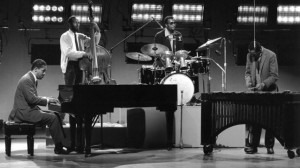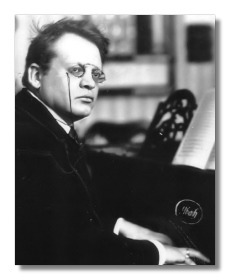
The Modern Jazz Quartet
Credit: http://songbook1.files.wordpress.com/
Max Reger: 4 Spezialstudien (Four special studies)
Reger composed his special piano studies for the pianist Paul Wittgenstein. Wittgenstein had lost his right arm in World War 1, but he continued his career as a left-hand virtuoso. Similar to Reger, Wittgenstein simply could not come to terms with the modernist expressions of his own time and preferred instead to retreat into the distant musical past.
Freely mingling transcriptions and arrangements, and following in the footsteps of Busoni and Reger, Wittgenstein used the music of Bach as a healing potion. Not merely in terms of finding a cure for the perceived degenerate expressions of his time, but also as a psychological remedy for his loss of limb. And that’s the real beauty of Bach, because his music naturally provides a psychological refuge for humanity. Best of all, it does not matter whether his music is adopted for piano left-hand, for the ukulele, didgeridoo, or even the banjo!

Max Reger
Credit: http://www.classical.net/
During the 1930’s, Arnold Schoenberg wrote a relatively unknown essay entitled How One Becomes Lonely. Here he lamented the fact that audiences abandoned him because they thought he was writing music for the brain and not the heart. In public opinion, Schoenberg’s music was connected with atonality, the composition with twelve tones and with horror. Yet in reality, Schoenberg had a profound respect for musical tradition and fashioned a number of arrangements of works by older composers. Highly personal in nature, practical contact with tonality gave him personal balance and perspective. And as expected, the music of J.S. Bach played a pivotal role. But there was one more practical reason to transcribe Bach, and that’s found in Schoenberg’s hatred of the organ. “It is an obsolete instrument,” he wrote, as “no one, no musician and no layman needs so many colors as the organ has.” So he went to work and arranged a couple of Bach chorale preludes for orchestra, helping these works to transcend and escape their original narrow context.

Arnold Schoenberg
Credit: http://www.bach-cantatas.com/
The Modern Jazz Quartet, established in 1952, probably best embodied the creative synthesis of classical music and jazz. Featuring John Lewis (piano), Milt Jackson (vibes), Percy Heath (bass) and Connie Kay on drums, the group elegantly and effortlessly fused jazz, blues and classical music on a number of great recordings. The group’s founder John Lewis firmly believed that “J.S. Bach and the blues were compatible, and it was natural to combine classical form with jazz improvisation and polyphony.” At the heart of their success was a musical style that fused composition with virtuosic improvisation. The group performed for over forty-years and received various honors and awards.
The Modern Jazz Quartet: Blues on Bach
Please join us next time when we take a listen to the influence Bach’s music exerted on Richard Strauss and Gustav Mahler, spiced up by ingenious transcriptions for vibraphone and accordion!
